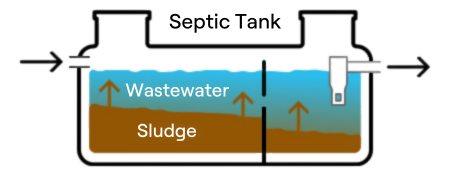Are garbage disposals bad for septic tanks? Septic systems are a vital component of many homes and can be costly to repair if damaged. Septic service providers and plumbers strongly advise against garbage disposals, let's see why.
Traditional garbage disposals introduce food waste directly into the septic tank, leading increased sludge build up, reduced tank capacity, increased septic pumping, decreased septic bacteria efficiency, and potential leach field clogs.
The Impact of Garbage Disposals on Septic System Efficiency
In a well-functioning septic tank, the sludge – the settled solids – is naturally broken down by bacteria. This process keeps the sludge levels manageable. However, frequent disposal of food waste through a garbage disposal overburdens these bacteria, leading to:
- Elevated sludge levels
- Reduced tank capacity
- Worse bacteria wastewater treatment
- Potential leach field clogs
- Increased septic pumping

The Financial Burden of Garbage Disposals
Increased sludge levels mean more frequent septic tank pumping – potentially up to twice as often. Considering the average cost of septic tank pumping in the United States is around $225 to $600, and inspection rates average $150-$450, the minor convenience of a garbage disposal does not seem to justify the additional expense.
Garbage Disposal Alternative That Protects Your Septic
If you want the convenience of a garbage disposal without risk of damage and excess pumping, Sepura only allows liquids to drain into your septic while sending all food scraps to an odor-eliminating compost bin under your sink.
By separating liquids from solids, your food scraps in the bin will be drier, eliminating leaky garbage bags or compost bins and keeping your kitchen clean and free of fruit flies.
With Sepura you won't need to keep a messy compost bin on your counter, frequently empty your sink strainer, and you ensure that no food enters your septic.
Leach Field Clogs
Leach fields play a pivotal role in the septic system's function. They act as a natural filtration system, allowing liquid waste to be absorbed into the soil while preventing contaminants from entering groundwater.
However, when clogs or sludge buildup occurs, it can jeopardize the integrity of the leach field.
Ensuring that food waste doesn't enter the septic tank, effectively eliminates the risk of sludge buildup and clogs in the leach field.
Benefits from not allowing food in your septic tank:
- Longer lifespan for the septic system
- Reduced maintenance costs
- Significantly lower likelihood of leach field failure.

Preserving System Efficiency
The bacteria in septic tanks are not intended to break down food. When food continuously enters septic tanks, the bacteria can’t break it down fast enough which causes sludge buildup.
Sludge buildup will result in the need for more frequent pumping and maintenance. Keeping food out of your septic not only prevents this disruption but enhances the septic system's efficiency by maintaining the optimal balance of beneficial bacteria.
Environmental Considerations
Garbage disposals merely shift the food waste problem. A more sustainable solution is composting. This process turns organic waste into a valuable resource, enriching soils in gardens and lawns. Composting is easy to adopt and beneficial for both gardening enthusiasts and non-gardeners. It allows you to:
- Enrich garden soil
- Create potting mixes
- Produce moisture-retaining mulch
- Support local community gardens
The Ultimate Garbage Disposal Alternative for Septic Systems

One of the significant concerns with traditional garbage disposals is their potential to overload septic systems, leading to clogs and sludge buildup in leach fields. This occurs when food waste is introduced directly into the septic tank.
That’s why homeowners on septic tanks are using Sepura, they get the convenience of a garbage disposal without the risk of damage to their septic tanks.
Why Sepura is The Most Popular Septic DisposalSepura revolutionizes food waste disposal by diverting food scraps away from the septic tank altogether.
Instead, it efficiently filters solids into an under-sink compost bin while allowing only liquids to flow down the drain. This crucial differentiation means that food waste never reaches the septic tank, safeguarding the delicate balance of the system.
Conclusion
While conventional garbage disposals can pose challenges for septic systems, Sepura offers an innovative and effective solution.
By redirecting food waste away from the septic tank, it safeguards the system's integrity, promotes efficiency, and supports sustainable practices.
With Sepura, homeowners can confidently embrace a septic-friendly waste disposal solution that benefits both their households and the environment.


